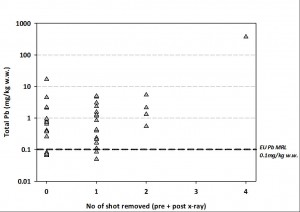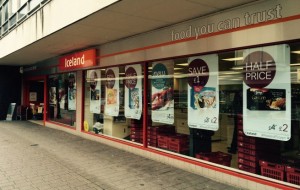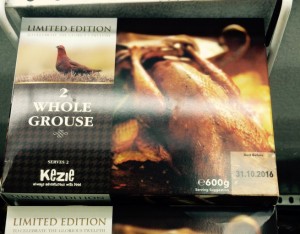 This is Lead Week on this blog.
This is Lead Week on this blog.
We now know that, on the basis of this sample of 40 Red Grouse, Iceland Foods have been selling grouse meat with average lead levels over 100 times the maximum legal level for other meats (though it is legal for them to sell game meat with such high lead levels).
When I wrote in July that Iceland were probably selling game meat with lead levels ten times higher on average than would be legal for non-game meat I was being generous to them. I made that statement on the basis of previous studies, primarily that of Pain et al 2010.
Pain et al. did somewhat similar analyses of a range of game meat on sale to the British public from a variety of sources. They looked at Pheasant, partridges, Woodcock, Woodpigeon and Mallard as well as Red Grouse. That study analysed 20 Red Grouse carcasses: this study analysed 40 Red Grouse carcasses.
 The results presented here show higher levels of lead in Red Grouse meat than those of the Pain et al. study. Not only were 78% of the samples in the present study above the MRL for non-game meat (31/40) compared with 45% (9/20) in the study by Pain et al. but the proportion of the samples with lead levels more than ten times the MRL in this sample (37%, 15/40) was higher than that in the study of Pain et al. (10%, 2/20).
The results presented here show higher levels of lead in Red Grouse meat than those of the Pain et al. study. Not only were 78% of the samples in the present study above the MRL for non-game meat (31/40) compared with 45% (9/20) in the study by Pain et al. but the proportion of the samples with lead levels more than ten times the MRL in this sample (37%, 15/40) was higher than that in the study of Pain et al. (10%, 2/20).
A wide variety of studies has shown that elevated blood lead levels cause increases in blood pressure, increases in chronic kidney disease, increases in the rate of spontaneous abortion and lower the IQ of children. A published study by Green and Pain (2012) shows that eating even one meal a week containing game meat will increase the average daily lead intake of a reasonably typical person several-fold: something like seven-fold.
 Remember, the Food Standards Agency states that ‘There is no agreed safe level for lead intake‘ and also that ‘occasional consumption of lead-shot game birds’ that would have minimal effect on overall exposure to lead would be ‘about twice a year’ (see here and here) although this advice has not found its way onto their website yet.
Remember, the Food Standards Agency states that ‘There is no agreed safe level for lead intake‘ and also that ‘occasional consumption of lead-shot game birds’ that would have minimal effect on overall exposure to lead would be ‘about twice a year’ (see here and here) although this advice has not found its way onto their website yet.
I eat game occasionally – several times a year. I quite like it. I like venison (which has lower lead levels, on average than ‘small game’ such as gamebirds) and I would be happy to eat more pigeon meat if it weren’t shot with lead. I don’t think that grouse is the best game meat that I have eaten but it’s OK – although ridiculously expensive in restaurants.
How about you? What’s your game intake? Pretty low, probably (apart perhaps from those in the shooting community who read this blog for a little excitement in their lives).
A survey by the British Association for Shooting and Conservation of its members in northwest England and northeast Wales measured the frequency of consumption of game meat but not the amount consumed. Just under a quarter (23%) of households ate game meat (excluding venison and wild boar) once a week or more. These families will, on the results of this study and all other similar studies that I know, be subjected to high dietary lead intake. BASC has over 100,000 members.
A more recent survey by BASC and the Countryside Alliance of their members indicated that in the UK 5,500 – 12,500 under eight year olds (in families of BASC or the Countryside Alliance members) consumed game once a week or more, and that 27,000-62,000 adults (in families of the Countryside Alliance and BASC) eat game more than once a week. These must be minima as not everyone who eats game, even lots of game, necessarily is a member of BASC or the Countryside Alliance.
According to everything we know, although I am not aware of any studies, those employed on game shooting estates, presumably especially gamekeepers and their families, will have much higher lead-shot game intakes than the average member of the public (several lead-shot game meals a week would be expected) as this is a free or cheap, and readily available, source of meat. They are also likely to consume game meat that is so heavily shot that it cannot be sold as an attractive proposition to the public, which, I surmise, is likely to have even higher lead levels than those identified here.
Gamekeepers certainly won’t be trooping down to Iceland or any other supermarket to buy their game meat, but the high lead levels recorded in this study should be of concern to them too.
Tomorrow, I will start to comment on the policy implications of these results.
[registration_form]
I eat game a few times a year, certainly more than twice, although mostly venison. I’ve only eaten grouse once – unlike Mark, though, I have to confess I thought it was quite extraordinarily good. It was heather perfumed and delicious.
I wonder if the potential income from treating Grouse as an exclusive luxury food (ie not at all a brand associated with Iceland) might help to offset a reduction in the value of the shooting itself if the industry were forced to de-intensify?
This is good evidence to send to the Government whilst they are considering the Independent Lead Ammunition Groups Report! Very, very good evidence! Well done.
Perhaps that’s why the Govt. are 16 days late responding to the 10k petition threshold? Maybe they are even discussing with the FSA?
Clearly there are in excess of 23k happy with the current risk to human health through the ingestion of lead via an unregulated food ‘industry’?
Mark well highlighted criminal neglect of the children of gamekeepers. The Toffs ought to be ashamed.
We have eaten venison regularly over many years. Just thought it was a good lean meat. After reading and thinking about the lead which might be involved we will not be eating it anymore. We used to eat pigeon breasts, but it is fiddly to look thoroughly for the shot and a worry you may have missed some. We are now favouring vegetables and fish.
Anne – I like venison. It has lower lead levels than small game. Of course, it might be shot with non-toxic ammunition – more and more organisations are moving that way. RSPB did years ago. FC England look like they are heading that way too. Ask the restaurant or game dealer about the ammunition – that helps spread the word. Do it in a loud voice in a restaurant and everyone will lsiten.
Hello Mark, I have just seen your reply. Yes, very good idea. i will write to our supplier as we order it on line. They are (I think) a very responsible Company so hopefully with affirmation of use of non-toxic ammunition we will be able to enjoy our venison casseroles again! Delicious.
I have had a response from the supplier and the venison is killed with a ‘brass bullet’. Still think we will not buy any more as worried about whole subject of lead. You are doing a brilliant job highlighting this issue.